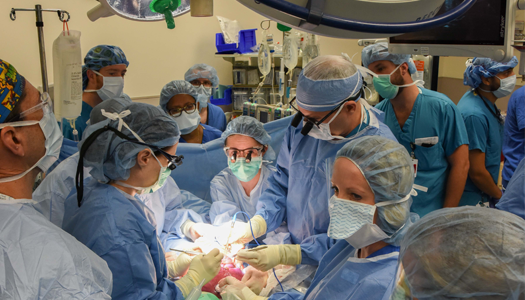Specialists at the Fetal Care Center are among a select few experts in the Midwest—and the only center in the St. Louis region—who perform fetal surgery to treat myelomeningocele (MMC), a severe form of spina bifida. We offer both open and fetoscopic repair of MMC while your unborn baby is still in the womb. Only select fetal centers in the country have the comprehensive team of fetal surgeons and neurosurgeons with skill sets to perform both of these complex surgeries.
About Myelomeningocele
Myelomeningocele, a severe form of spina bifida, is the most common survivable spinal cord defect, occurring in approximately 1,500 babies in the United States every year. Early in fetal development, the neural tube fails to completely close, leaving an opening through which part of the spinal cord and associated nerves are exposed. This defect can lead to hydrocephalus (fluid on the brain), displacement of the hindbrain, and damage to the exposed nerves that results in disability corresponding to the level of the spine at which the opening exists. This damage is irreversible at birth, despite early repair. While fetal surgery does repair the birth defect and improves quality of life, it is not a cure. Spina bifida is a lifelong condition. Learn more about spina bifida.
Fetal Surgery for Spina Bifida: What to Expect
Specialists at the Fetal Care Center perform both an open and fetoscopic fetal surgery on unborn babies with myelomeningocele who meet certain criteria. Doctors place the sac of spinal cord and nerves back into the spinal canal while your unborn baby remains in the womb.

Fetal surgical repair of MMC has been shown to decrease rates of hydrocephalus, reverse hindbrain herniation, and improve lower extremity motor function. It was established as a standard-of-care option in 2011, but it is still important to carefully consider all the risks and benefits.
Fetal surgery candidates meet with a team of doctors, including a WashU Medicine pediatric fetal surgeon, neonatologist, pediatric neurosurgeon, and both obstetric and pediatric anesthesiologists. Each person has a specific role in caring for you and your baby. We will partner with you to decide which approach best suits your medical needs and care goals.
After Fetal Surgery for Spina Bifida
- Open repair: Open fetal surgery increases the risk of complications, including early labor and delivery. After surgery, you will need to stay close to our hospital from the time of surgery until delivery. Our social workers and staff will help you make housing arrangements if needed.
- Fetoscopic repair: Patients who have the option and choose to undergo the fetoscopic repair will need to remain near the hospital for two weeks after surgery. After that, we can often work with your referring maternal-fetal medicine specialist or obstetrician so you can receive the rest of your pregnancy care close to home. If your home hospital can provide the specialized care needed for mom and baby during and after delivery, you may have the choice to deliver your baby there.
For the remainder of your pregnancy, your ongoing prenatal care will be coordinated by our Fetal Care team. Your schedule of follow-up appointments will likely include:
- Weekly visits for ultrasound monitoring either at the Fetal Care Center or with your collaborating maternal-fetal medicine physician
- Biophysical profiles to assess your baby’s well-being
- Monitoring of your wound healing and any signs of premature labor
Delivery and follow-up
Women who undergo open repair will deliver by cesarean section, as it’s not safe to labor after an open fetal surgery. For all future pregnancies, they will also need to deliver by C-section.
Women who undergo the fetoscopic repair surgery can deliver vaginally, though some patients might need a C-section if there are any obstetrical concerns. In future pregnancies, it might be safe to deliver vaginally as well.
After delivery, your baby may receive advanced medical care in the Level IV Newborn Intensive Care Unit (NICU) at St. Louis Children’s Hospital. At Barnes-Jewish Hospital and St. Louis Children’s Hospital, our focus is on keeping mom and baby together, which is why our NICU is connected to labor and delivery.
Children with spina bifida may have developmental and physical challenges. Your child receives exceptional care throughout childhood from the pediatric specialists at the Spina Bifida Clinic at St. Louis Children’s Hospital.
Contact Us
To make an appointment with a WashU Medicine fetal care specialist at the Women & Infants Center, call 888.230.8832.